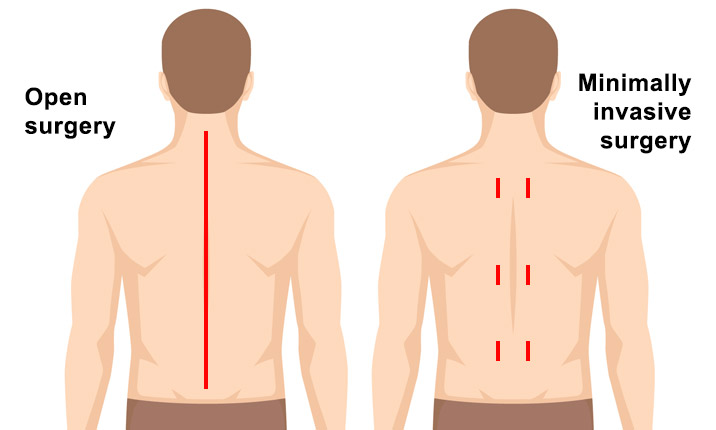Minimal Invasive Spine Surgery
- Home
- Minimal Invasive Spine Surgery
Minimal Invasive Spine Surgery in Pimpri Chinchwad
“Minimally invasive spine surgery (MISS) is sometimes called less invasive spine surgery. In these procedures, doctors use specialized instruments to access the spine through small incisions.”
Minimally invasive spine surgery (MISS) is sometimes called less invasive spine surgery. In these procedures, doctors use specialized instruments to access the spine through small incisions.
In a traditional open surgery, the doctor makes an incision that is 5 to 6 inches long, then moves the muscles to the side in order to see the spine. With the muscles pulled to the side, the surgeon can access the spine to remove diseased and damaged bone or intervertebral disks. The surgeon can also easily see to place screws, cages, and any bone graft materials necessary to stabilize the spinal bones and promote healing.
Minimally invasive spine surgery was developed to treat spine problems with less injury to the muscles and other normal structures in the spine. It also helps the surgeon to see only the location where the problem exists in the spine. Other advantages of MISS include smaller incisions, less bleeding, and shorter stays in the hospital.
what is Minimally Invasive techniques?
Minimally invasive spine surgery (MISS) is an alternative to traditional open surgical procedures performed to treat different spinal disorders, such as degenerative disc disease, herniated disc, scoliosis, and spinal stenosis. Spine surgery performed minimally invasively offers many potential benefits, such as small incisions, less cutting through soft tissues (eg, ligaments, muscles), outpatient options, less post-operative pain, and faster recovery.
Common Minimally Invasive Spine Surgeries
Risks of Minimally Invasive Spine Surgery
Any type of spine surgery offers potential benefits and risks—complications can occur. Listed below are several possible complications that may occur during and/or after spine surgery—both open and minimally invasive spine surgical procedures.
- Bleeding
- Blood clots
- Nerve damage
- Return of symptoms
- Failed fusion (known as pseudarthrosis or non-union)
- Infection
Recovery
Minimally invasive procedures can shorten hospital stays. The exact length of time needed in the hospital will vary with from patient to patient and with the individual procedure but, in general, MISS patients go home on the same day or in 1 to 2 days. Most patients having traditional surgery stay in the hospital for 3 to 5 days.
Because minimally invasive techniques do not disrupt muscles and soft tissues, it is believed that postoperative pain is less than pain after traditional open procedures. Although you should still expect to feel some discomfort, advancements in pain control now make it easier for your doctor to manage and relieve your pain.


